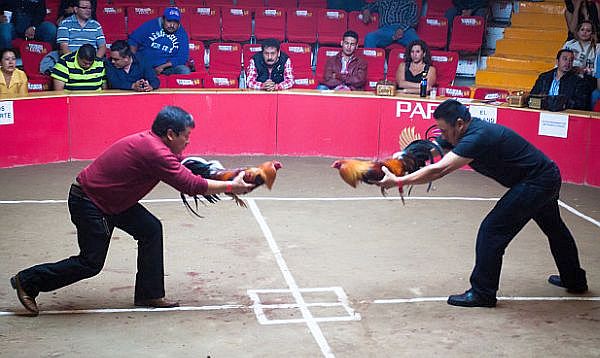Texcoco, Mexico ó In a small arena just north of Mexico City, fans trickle into their seats as two men enter a sandy ring, each cradling a rooster like a fragile heirloom. The men stare intensely at each other, bending their knees and delicately holding out the animals in front of them. Then the crowd quiets. An announcer gives the cue. And the men let go.
Suddenly, the birds fly forward, attacking each other with legs and beaks and wings flapping furiously, their feathers flying in a brief and brutal ballet. The scuffle is almost cartoonish in its speed and intensity. The birds move so quickly, itís like theyíre fighting in fast-forward. When itís over, one of the roosters is dead - lying in a pool of its own blood.
Watching from the front row is 50-year-old David Carlos Cruz, a stocky man with a thin mustache. Heís the trainer of the losing gamecock, and itís the first time this evening that heís seen one of his roosterís bleed out. Heís been here for five days now, at the palenque (cockfighting arena) in Texcoco, and has led dozens of roosters into battle. Some won, others lost, but overall, heís made money for his boss. "Cockfighting," Cruz says, taking a swig of beer, "is really about gambling."
Several hundred years have passed since Spanish colonists brought cockfighting from the Philippines to Mexico, and today itís one of the countryís most cherished traditions. In the United States, the practice is banned in all 50 states, but in Mexico, where itís legal and regulated, both rich and poor have celebrated the sport ó from Emiliano Zapata, a leader of the Mexican Revolution, to Jorge Hank Rhon, the infamous former mayor of Tijuana.
 |
The Texcoco Fair is certainly a spectacle. Every year, thousands attend to ride the roller coasters and merry-go-rounds and see the Mexican-style rodeos. But cockfighting is among the fairís biggest attractions. In some ways, these fairs are a Mexican version of the circus games of the ancient Romans. The palenque is like a miniature "Colosseum," and the gamecocks are like tiny gladiators; whenever the two of them fight, only one is meant to survive.
The sportís inherently bloody nature is something that Cruz knows all too well. He has been a professional gallero (trainer) all his life. Both his father and grandfather taught him the tricks of the trade. "Itís a beautiful job," he says. "I take pride in watching my birds grow to be good fighters. You really have to like what you do, because trainers donít make very much money."
The average salary, he says, is just $800 a month, about as much as a taxi driver in Mexico City. Thatís because like Cruz, most trainers donít own the roosters. All the cocks he trains are the property of wealthy ranchers who earn good money betting on their birds. Depending on the scale of the venue, some wager as much as $1,500 on just a single fight.
Whether a rooster wins or loses is usually a matter of chance. "You never know if your rooster is strong enough," he says. "Most of them fight for the first time, and you havenít seen any of the opposing birds."
Trainers like Cruz work with dozens of roosters at a time, all of which are bred for their strength and stamina. The trainerís role is to get the birds into fighting shape, and a good trainer knows exactly how much to feed his gamecocks and how hard to work them. "We throw them in the air to have them flap their wings, which makes them stronger," Cruz says. "We put them on a treadmill to have them run."
 |
"I raised all of these birds by myself," says Cruz. "I hate to see them die. But itís not like they have a bad life. Before they enter the arena, they are treated like princes."
Critics disagree. While the sport is regulated, in part to make it more humane, animal rights groups and others that say cockfighting is a clear case of animal abuse. And over the past year, across the country, observers say there have been a growing number of protests in the streets, demanding that cockfighting be banned altogether.
A number of legislators have begun to listen. Some opponents like GonzŠlez, the Mexican Senator, are especially concerned about unregulated cockfights, which are held every week across Mexico. These corrales are particularly popular with criminals. The matches are often rigged, which sometimes leads to shootouts in the stands.
Whether or not the critics will succeed is unclear. But Cruz says that cockfights shouldnít - and wonít ever be prohibited. "They are a part of our culture, our traditions," he says. "No one should try to take that away."
As we speak, Cruz watches his next fighter enter the ring. His opponent is a larger bird with long, golden feathers. When the bout begins, the roosters charge in another flurry. Moments later, Cruz watches blankly as his gamecock struggles, then fails to rise. Within minutes, itís no longer breathing.
Original Story


